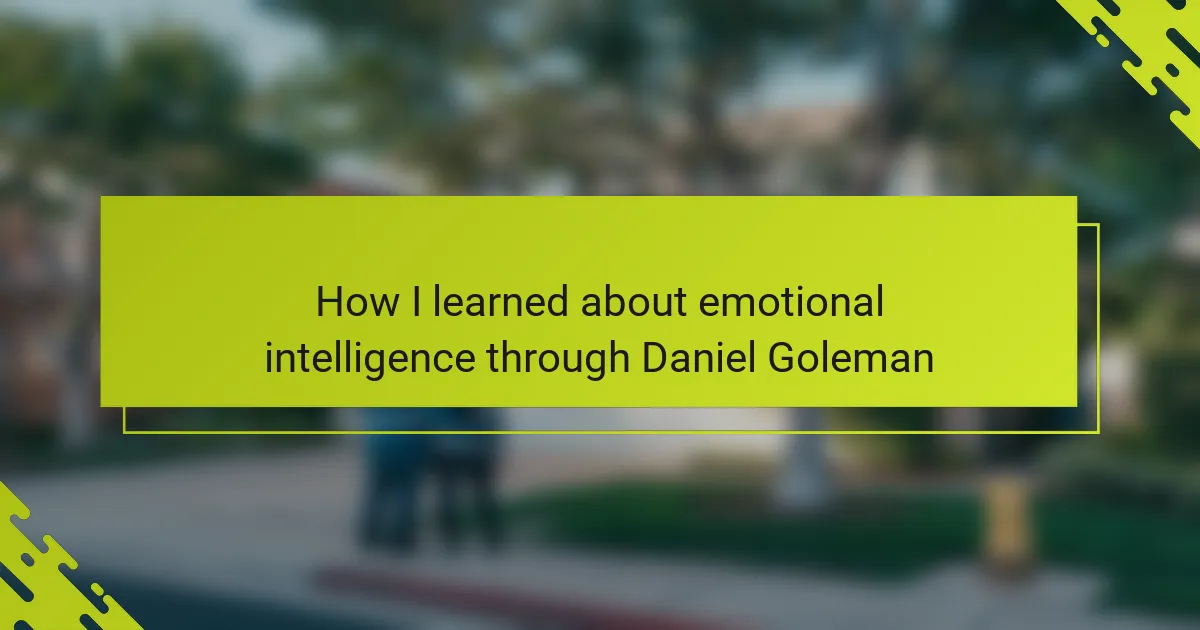Key takeaways
- Emotional intelligence involves self-awareness and managing emotions, empowering individuals to navigate relationships and difficult conversations.
- Goleman’s five components of emotional intelligence—self-awareness, self-regulation, motivation, empathy, and social skills—are practical skills that can be developed over time.
- Practicing emotional intelligence daily involves checking in with oneself and being empathetic towards others, fostering deeper connections and compassionate interactions.
- Building resilience through emotional intelligence means recognizing emotional patterns, responding intentionally, and treating oneself with kindness during challenging times.
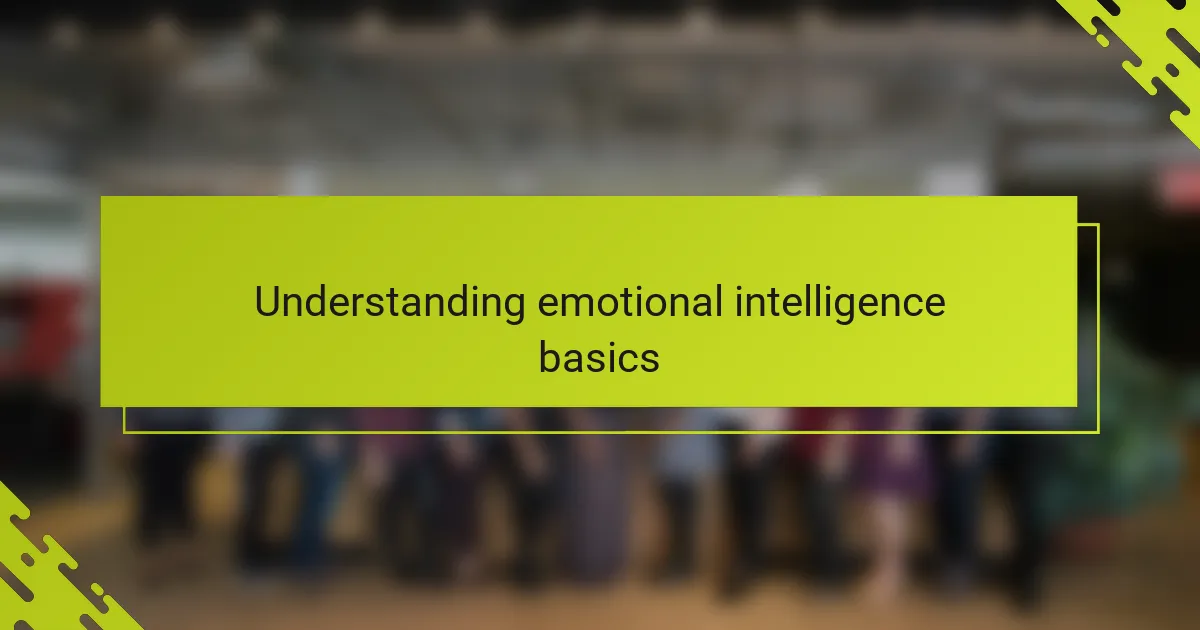
Understanding emotional intelligence basics
Emotional intelligence, as Daniel Goleman describes it, isn’t just about recognizing feelings; it’s about understanding how those feelings influence our thoughts and actions. I remember the first time I realized that being aware of my emotions could actually help me navigate difficult conversations with my family. Have you ever felt overwhelmed but didn’t know why? That’s where emotional intelligence starts—by naming those feelings and exploring their roots.
One of the basics Goleman highlights is self-awareness, which for me has been both challenging and freeing. Identifying my emotional triggers was like unlocking a secret door to self-compassion. It made me wonder: how often do we let our emotions dictate behavior without taking a moment to pause and reflect?
Another key part is managing emotions effectively, which is more than just suppressing feelings. I’ve learned that it’s about finding balance—acknowledging when I’m upset but choosing responses that align with my true self. Isn’t that a powerful way to live, especially within communities where emotional nuances can be so deeply layered?
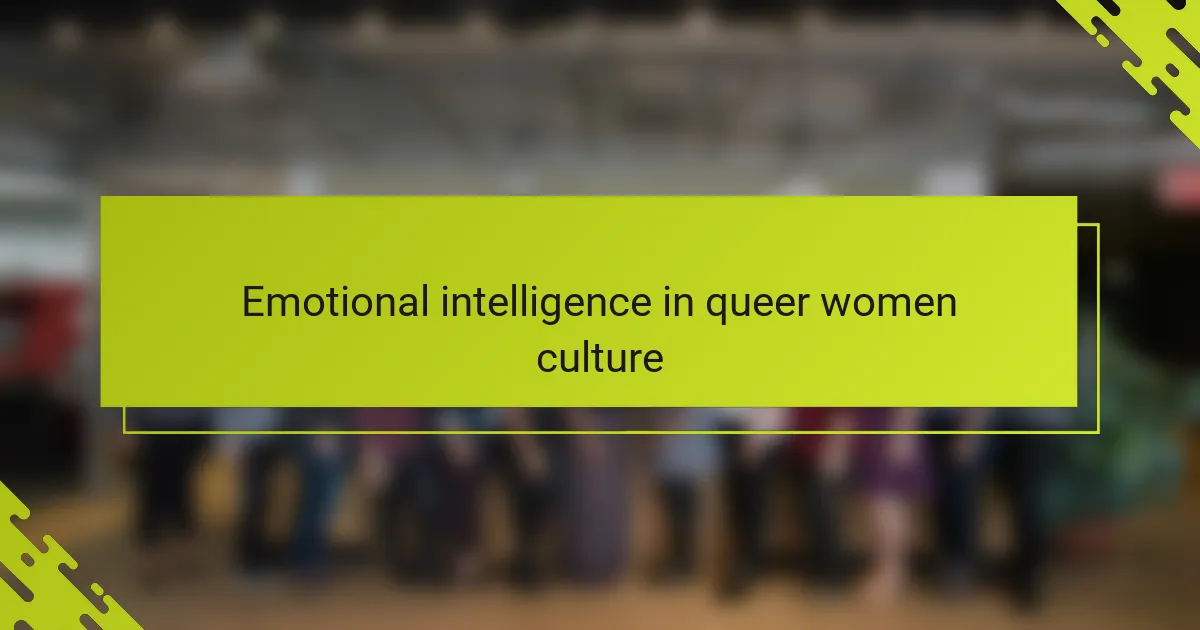
Emotional intelligence in queer women culture
In queer women culture, emotional intelligence becomes a vital tool for building authentic connections. I’ve noticed how many of us rely on a nuanced understanding of emotions to create safe spaces where vulnerability isn’t just accepted—it’s celebrated. Have you ever experienced that unspoken empathy that just feels like it comes from knowing someone’s emotional landscape without words?
Navigating identity and societal pressures often layers complex feelings, making emotional intelligence even more critical. Personally, I’ve found that tuning into my emotions helps me process not only what I’m going through but also how others around me might be feeling. This awareness fosters solidarity and deepens trust within our communities.
Emotional intelligence also means recognizing when to hold space and when to step back, a balance many queer women intuitively practice. It’s fascinating how this skill, often unspoken, strengthens collective resilience. When was the last time you paused to truly consider the emotional currents in a group conversation? That moment of reflection can change everything.
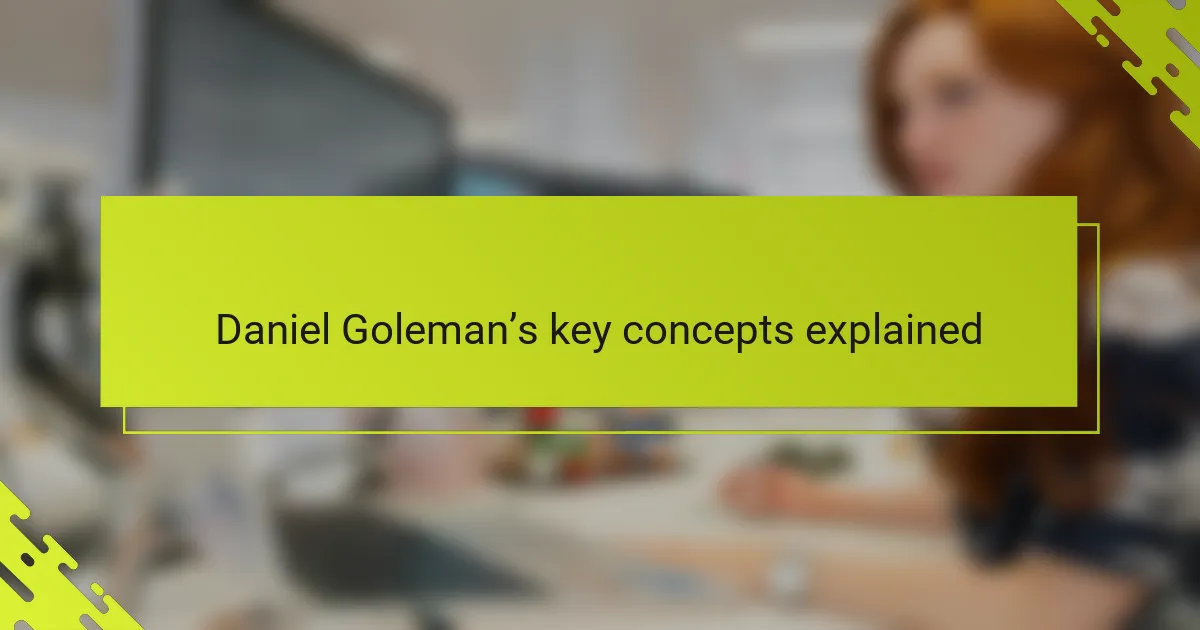
Daniel Goleman’s key concepts explained
Goleman breaks emotional intelligence down into five key components: self-awareness, self-regulation, motivation, empathy, and social skills. I found that understanding these pieces helped me see emotional intelligence not as a vague feeling but as a set of practical skills I could develop over time. Have you ever thought about how empathy, for instance, isn’t just about feeling for someone but actively tuning into their experience?
What surprised me most was the emphasis on self-regulation—not just controlling emotions but managing them thoughtfully. It made me reflect on times when I reacted too quickly, only to regret it later. Learning to pause, breathe, and choose my response has shifted so much in both how I relate to myself and others.
Then there’s motivation, which Goleman describes as the inner drive to pursue goals with passion and persistence. I hadn’t connected emotional intelligence with motivation before, but now I see how understanding my emotions fuels my commitment to personal growth. Have you noticed how being honest with yourself about what truly matters creates this almost unstoppable energy?
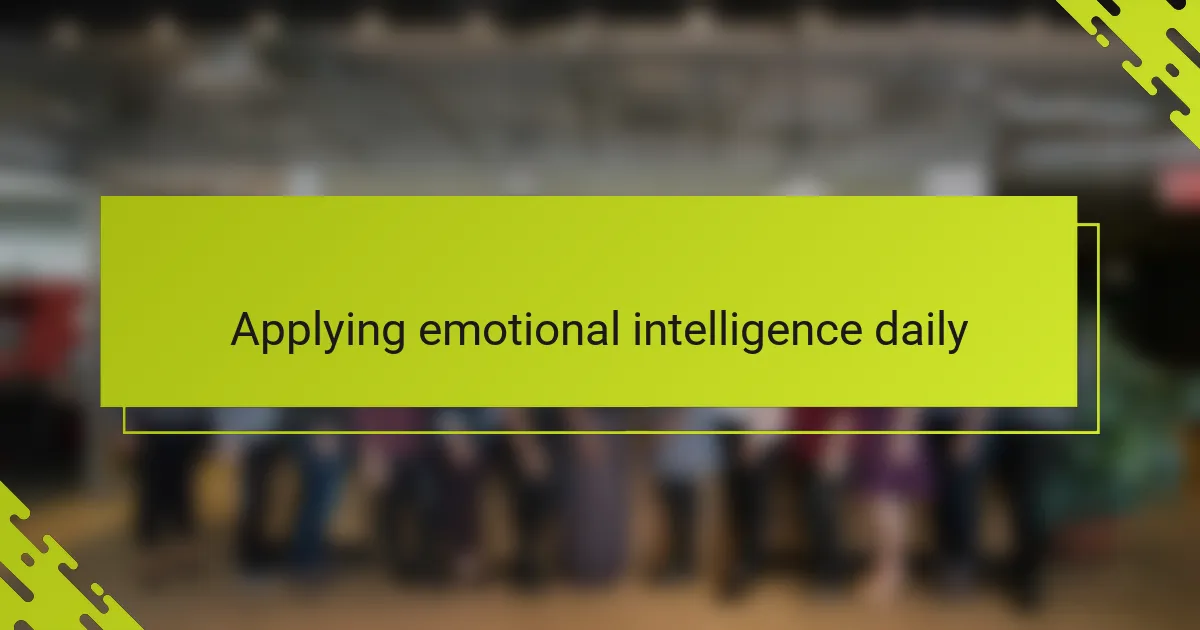
Applying emotional intelligence daily
Using emotional intelligence daily means pausing to check in with myself, especially in moments of tension. I remember feeling frustrated during a meeting, but instead of snapping, I took a breath and asked myself what was really behind that irritation. That small pause changed how I responded and kept the conversation open.
I also try to practice empathy intentionally, tuning into how others might be feeling even when they aren’t saying much. It’s incredible how much connection can deepen simply by noticing a friend’s subtle cues and responding with understanding. Have you ever had a moment where just acknowledging someone’s unspoken feelings made all the difference?
Sometimes, applying emotional intelligence feels like juggling—balancing my feelings, sheltering my energy, and staying present for others without losing myself. It’s not easy, but each day brings new chances to practice these skills and create more compassionate interactions. How do you find ways to stay emotionally tuned in when life gets chaotic?
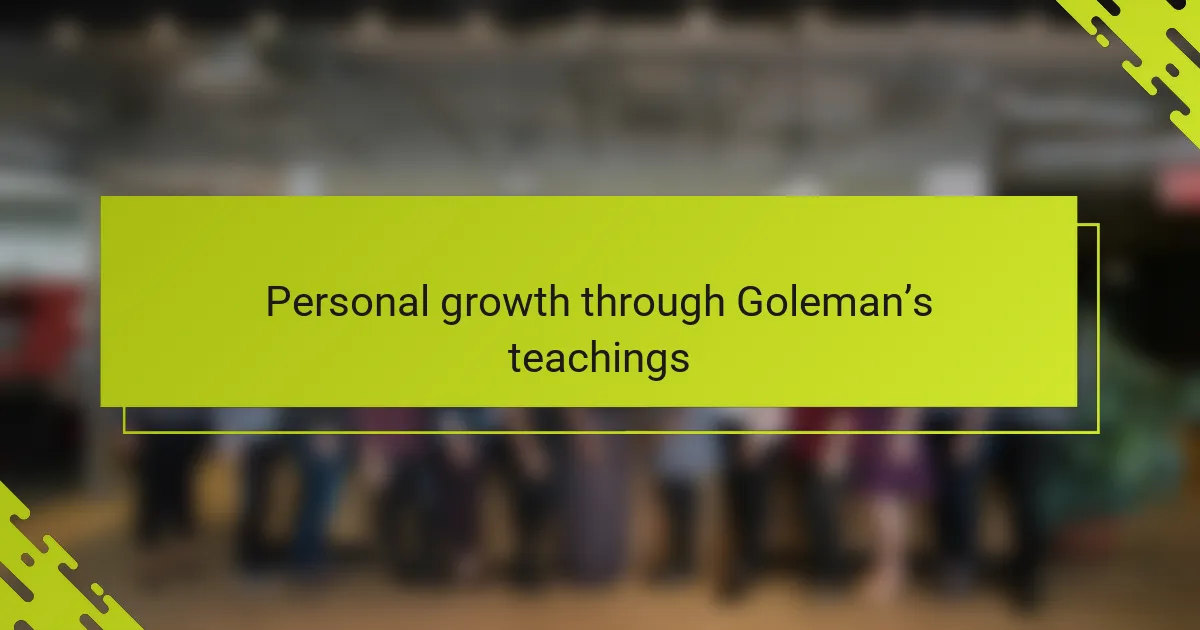
Personal growth through Goleman’s teachings
Embracing Goleman’s teachings has been a turning point in my journey toward self-acceptance and resilience. I recall a moment when recognizing my emotional patterns helped me break free from a cycle of self-doubt—a breakthrough that felt both exhilarating and deeply human. Have you ever experienced that sense of clarity that comes from understanding yourself on a deeper level?
What strikes me most about personal growth through emotional intelligence is how it invites patience with oneself. Learning to respond thoughtfully rather than reacting impulsively has transformed not only my relationships but also how I hold space for my own discomfort. It’s a daily practice, one that asks me to stay curious rather than critical when emotions arise.
Ultimately, Goleman’s framework gave me permission to see emotional development as ongoing—not a destination but a dynamic path. This perspective has encouraged me to embrace mistakes as opportunities to grow, especially within the rich and sometimes challenging tapestry of queer womanhood. How might your own story shift if you viewed emotions as guides rather than obstacles?
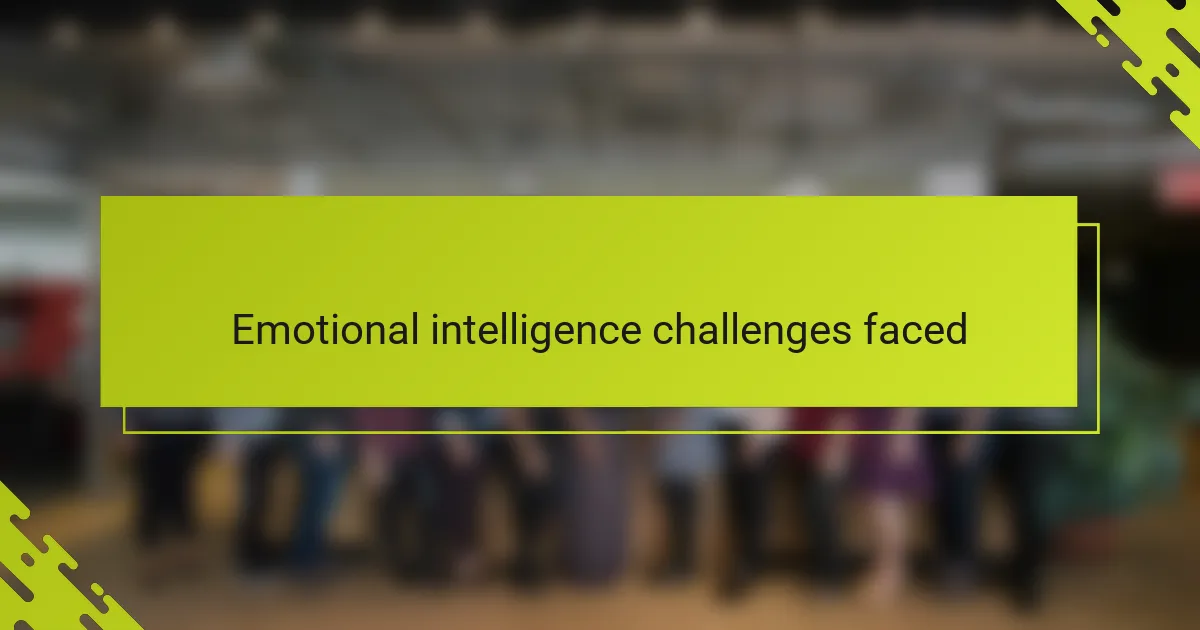
Emotional intelligence challenges faced
Emotional intelligence hasn’t come easily for me; I often struggled with naming what I was feeling in moments of stress. Have you ever caught yourself reacting before fully grasping why? That gap between emotion and understanding can lead to misunderstandings that weigh on both me and those I care about.
Managing emotions, especially intense or conflicting ones, feels like walking a tightrope. I remember a time when I tried to push down discomfort around a heated conversation, only to have those feelings bubble up later in unexpected ways. It taught me that emotional regulation isn’t about ignoring feelings but engaging with them thoughtfully—a skill I’m still learning to refine.
Another challenge is empathy without losing myself. In queer spaces, it’s easy to soak up others’ emotions deeply, sometimes to my own detriment. I often ask myself, how do I hold space without erasing my boundaries? Balancing connection and self-care remains an ongoing, delicate dance.
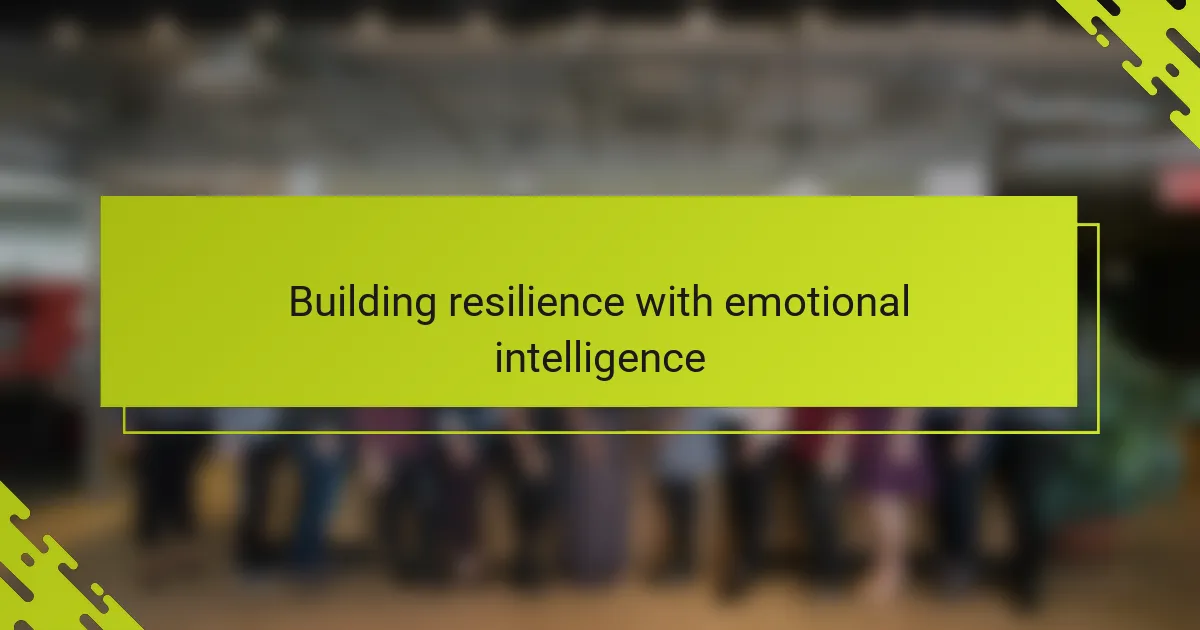
Building resilience with emotional intelligence
Building resilience with emotional intelligence has been a revelation for me in moments when life felt like it was pulling me under. I used to think resilience was just about “toughing it out,” but Goleman’s work showed me it’s about recognizing my emotional patterns and responding with intention. Have you ever noticed how taking a breath before reacting can create a surprising space of calm even in chaos?
I’ve found that self-regulation—the ability to manage emotions rather than suppress them—is at the heart of bouncing back from setbacks. There was a time I faced rejection in a community I deeply cared about, and instead of shutting down, I used my emotional awareness to process the hurt and regain my footing. It was messy and imperfect, but that process strengthened me more than avoiding the pain ever could.
Resilience also means leaning on empathy—not just toward others but toward myself. When I remember to treat my struggles with kindness rather than judgment, it feels like building an emotional muscle that helps me stay steady. How often do you give yourself patience when emotions run high? For me, that self-compassion has been the cornerstone of true endurance.
